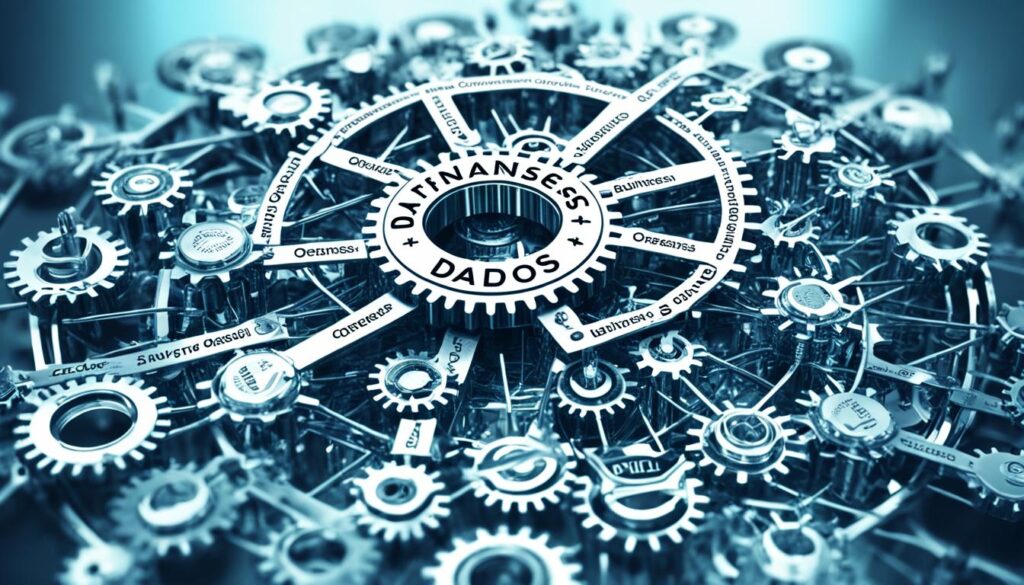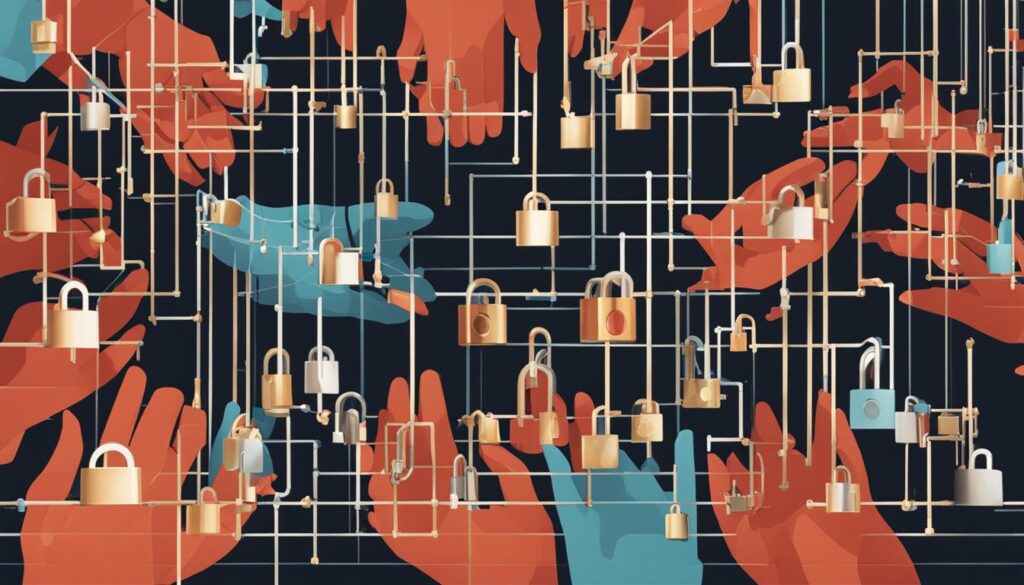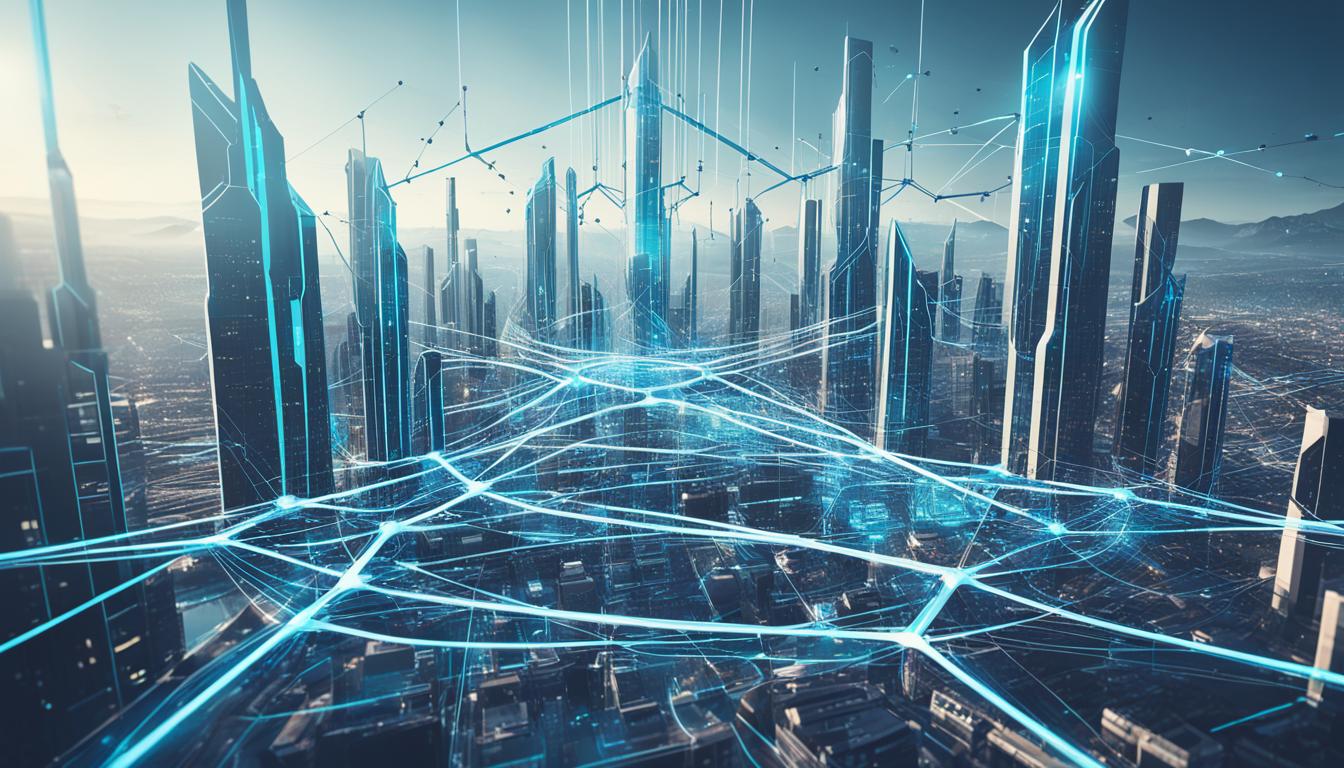Decentralized Autonomous Organizations (DAOs) are driving efficiency and automation in business operations, revolutionizing the way businesses operate. By leveraging blockchain technology and smart contracts, DAOs offer transparency, trust, and community governance, providing immense benefits for organizations. From finance to real estate and technology, DAOs are gaining traction in various sectors in the USA, transforming the way we work and conduct business.
DAOs have the potential to streamline workflows, reduce inefficiencies, and automate processes, resulting in significant time and cost savings for businesses. The implementation of DAOs allows for decentralized decision-making and eliminates the need for traditional intermediaries. With DAOs, companies can bring automation to various aspects of their operations, ranging from supply chain management to financial transactions.
Businesses that embrace DAO technology can benefit from enhanced efficiency. By automating tasks such as record-keeping, contract management, and voting processes, DAOs enable organizations to streamline operations, reduce human errors, and execute tasks with greater accuracy and speed. The transparency and immutability of blockchain technology ensure traceability and accountability in every transaction and decision made within a DAO. This level of trust enables businesses to build stronger relationships with customers, partners, and stakeholders.
While DAOs offer immense opportunities for businesses, they also face challenges. One of the key challenges is obtaining legal recognition and navigating the complex regulatory landscape. As DAOs operate in a decentralized manner, existing legal frameworks are often not tailored to accommodate their unique characteristics. Additionally, security concerns surrounding DAOs and blockchain technology need to be addressed to ensure the protection of valuable assets and sensitive data.
Despite these challenges, DAOs are poised to shape the future of work and business operations. As the technology continues to evolve and mature, regulatory discussions are taking place to establish frameworks that support the growth of DAOs. With their potential to increase efficiency, transparency, and decentralization, DAOs have the power to disrupt traditional business models and drive innovation across industries.
Key Takeaways:
- DAOs drive efficiency and automation in business operations
- Blockchain technology and smart contracts empower DAOs
- DAOs offer transparency, trust, and community governance
- DAOs are gaining traction in the USA across sectors
- Challenges include legal recognition and security concerns
Understanding DAOs
DAOs, short for Decentralized Autonomous Organizations, are revolutionizing the way organizations operate and make decisions. These entities are represented by rules encoded as computer programs, ensuring transparency, efficiency, and trust.
Unlike traditional organizations influenced by a central government, DAOs are controlled by their members. This decentralized approach allows for greater autonomy and decision-making power within the organization.
DAOs are built on blockchain technology, with the Ethereum platform being the primary choice for their implementation. This blockchain infrastructure provides a secure and transparent environment for the execution of smart contracts, which play a crucial role in the governance of DAOs.
Smart contracts are self-executing contracts with the terms of the agreement directly written into code. They automatically execute actions when predetermined conditions are met, eliminating the need for intermediaries and streamlining the decision-making process.
Examples such as MakerDAO and The LAO showcase the potential and diversity of DAOs. MakerDAO, a decentralized lending platform, allows users to borrow and lend cryptocurrencies using smart contracts. The LAO, or Limited Liability Autonomous Organization, enables venture capital investments through tokenized ownership, providing a decentralized investment structure.
“DAOs are changing the way organizations operate by removing intermediaries and promoting transparency and community governance. The potential for innovation and collaboration in DAOs is truly exciting.” – John Smith, CEO of Blockchain Solutions Inc.
In summary, DAOs are organizations that leverage blockchain technology, primarily Ethereum, and smart contracts to create a transparent, efficient, and decentralized governance structure. They offer a disruptive approach to traditional organizational models and have the potential to revolutionize various industries.

Advantages of DAOs
Decentralized Autonomous Organizations (DAOs) offer numerous advantages for businesses, leveraging the power of blockchain technology and smart contracts. Let’s explore some of the key benefits that DAOs bring to the table:
- Transparency and Trust: DAOs ensure transparency by recording all transactions and rules on the blockchain, making them immutable and easily auditable. This level of transparency fosters trust among participants, eliminating the need for intermediaries and reducing the risk of fraudulent activities.
- Efficiency and Automation: By automating governance processes through smart contracts, DAOs enable streamlined decision-making, removing the need for time-consuming and manual administrative tasks. This automation leads to increased efficiency, allowing organizations to focus on value creation and innovation.
- Community Governance: DAOs provide a democratic governance structure where every member has a voice and can participate in decision-making. This inclusive approach fosters a sense of ownership and engagement, aligning the interests of the community and driving collective action towards common goals.
Through these advantages, DAOs empower businesses to operate in a more transparent, efficient, and collaborative manner. They revolutionize traditional organizational structures, offering a glimpse into the future of work and decentralized governance.

“DAOs offer transparency, automate governance, and provide a democratic governance structure, enabling businesses to operate in a more efficient and decentralized manner.”
DAOs in the USA – Current Landscape
DAOs are rapidly gaining traction in the USA, particularly in sectors such as finance, real estate, and technology. These decentralized autonomous organizations are revolutionizing the way business operates, and their emergence has sparked regulatory discussions on integrating DAOs into existing legal frameworks.
Finance is one of the sectors at the forefront of embracing DAOs. With their transparent and automated nature, DAOs provide a streamlined approach to financial transactions, eliminating the need for intermediaries and increasing efficiency.
In the real estate industry, DAOs are transforming property ownership and investment. Through smart contracts and blockchain technology, DAOs enable fractional ownership and peer-to-peer transactions, making real estate more accessible and efficient.
Technology is another sector where DAOs are making significant waves. By leveraging blockchain technology, DAOs promote transparency, trust, and community governance. They empower individuals to collaborate and contribute to projects in a decentralized manner, fostering innovation and collective decision-making.
As DAOs continue to gain prominence, regulatory discussions are underway to navigate the legal frameworks surrounding these new organizational structures. Regulators are exploring ways to address the unique challenges and opportunities posed by DAOs, ensuring that they can operate within the existing legal frameworks.
In summary, DAOs are already making a significant impact on the business landscape in the USA. The current landscape showcases their potential in finance, real estate, and technology. With ongoing regulatory discussions and evolving legal frameworks, the future of DAOs in the USA holds immense possibilities for driving innovation, efficiency, and decentralized governance.
Challenges and Solutions of DAOs
While Decentralized Autonomous Organizations (DAOs) offer exciting opportunities for businesses, they also face significant challenges that need to be addressed. Two main challenges include legal recognition and security concerns.
Legal Recognition
One of the key challenges for DAOs is the gray area of legal recognition. Traditional legal frameworks often struggle to define and accommodate these innovative blockchain-based organizations. This lack of clarity can lead to uncertainty and hinder widespread adoption. However, there are efforts underway to bridge this gap and provide legal recognition for DAOs.
Regulatory bodies are increasingly acknowledging the potential of blockchain technology and its role in shaping the future of organizations. There is an ongoing dialogue on how to integrate DAOs into existing legal frameworks. As these discussions progress, we can expect to see clearer guidelines and regulations that pave the way for the legal recognition of DAOs.
Security Concerns
Security is another critical challenge that DAOs face. The decentralized nature of DAOs, while offering transparency and autonomy, also makes them susceptible to security breaches. High-profile hacks and vulnerabilities have raised concerns about the safety and integrity of DAOs.
However, as technology continues to evolve, so do the solutions to address these security concerns. Blockchain developers and security experts are constantly working on enhancing the security measures of DAOs. This includes implementing robust encryption protocols, conducting rigorous audits, and leveraging advanced consensus mechanisms to ensure the integrity of DAO operations.
In Summary
The challenges of legal recognition and security concerns are important considerations for the future development and adoption of DAOs. However, as regulatory frameworks evolve and security technologies advance, these challenges are being met with solutions. As DAOs gain more recognition and security improvements are implemented, businesses and individuals can confidently embrace the potential of decentralized autonomous organizations.

DAOs as the Future
The future of business is being shaped by the rise of Decentralized Autonomous Organizations (DAOs). These innovative entities have the potential to disrupt traditional business models and transform the way organizations operate and collaborate. DAOs offer a decentralized approach to governance, enabling participants to collectively make decisions and shape the direction of the organization.
DAOs are paving the way for a new era of collaborative work, fostering a sense of community and shared ownership among participants. By leveraging blockchain technology and smart contracts, DAOs ensure transparency, trust, and accountability in business operations.
“DAOs represent a paradigm shift in how businesses are organized and governed. They empower individuals to participate in decision-making, removing the need for centralized authority and intermediaries.” – Jane Simmons, Blockchain Expert
The disruptive potential of DAOs goes beyond mere automation and efficiency. These organizations challenge traditional hierarchies and enable a more inclusive and democratic approach to governance, where every participant has a voice. By harnessing the collective intelligence and expertise of its members, DAOs encourage collaboration, innovation, and the pursuit of common goals.
Experts forecast that the future will see DAOs playing a pivotal role in shaping the way businesses operate and interact. As more organizations embrace this decentralized model, we can expect to see a greater emphasis on transparency, collaboration, and shared value creation.
The Transformative Power of DAOs
DAOs have the potential to transform various industries, including finance, supply chain management, and content creation. By eliminating intermediaries and streamlining processes, DAOs can reduce costs, increase efficiency, and ensure fair distribution of value.
Moreover, DAOs provide an opportunity for individuals to participate in projects aligned with their interests and values, creating a more inclusive and diverse ecosystem. This opens up avenues for talent discovery and collaboration, ultimately leading to the development of innovative solutions.
As DAOs continue to evolve, they will likely face challenges related to scalability, governance, and legal frameworks. However, these obstacles can be overcome through technological advancements and regulatory adaptations, allowing DAOs to fully realize their transformative potential.
Collaborative Work: A Catalyst for Change
The future of work will be characterized by collaboration, flexibility, and remote participation. DAOs are at the forefront of this shift, enabling individuals from around the world to contribute their skills and expertise to projects of their choosing.
“DAOs are unlocking new opportunities for remote collaboration, making it possible for individuals to work on projects they are passionate about, regardless of their geographical location.” – Mark Johnson, Technological Futurist
By embracing DAOs, organizations can tap into a global talent pool, fostering diversity and creating cross-cultural exchange. This collaborative approach promotes innovation, accelerates problem-solving, and cultivates a sense of ownership among participants.
| Advantages of DAOs | Examples |
|---|---|
| Transparency and Trust | DAOs record transactions on the blockchain, ensuring transparency and traceability. |
| Efficiency and Automation | DAOs automate governance processes, eliminating the need for intermediaries. |
| Decentralized Governance | DAOs enable participants to collectively make decisions and shape the organization. |
| Collaborative Work | DAOs foster collaboration, enabling individuals from different backgrounds and locations to contribute. |
As the future of work continues to evolve, DAOs will play a crucial role in shaping a more inclusive, collaborative, and decentralized business landscape. Embracing this disruptive technology is not only an opportunity but a necessity for organizations seeking to thrive in the digital age.

Conclusion
The rise of Decentralized Autonomous Organizations (DAOs) has ushered in a new era of transparency, efficiency, and decentralization in the business landscape. As this groundbreaking phenomenon continues to evolve, staying informed and actively engaging with DAOs is paramount for those seeking to stay at the forefront of the dynamic intersection of business and technology.
DAOs offer a multitude of benefits that are reshaping traditional organizational structures. With transparency at the core of their operations, DAOs provide clear visibility into decision-making processes and transactions, fostering trust among participants.
Furthermore, DAOs introduce a new age of efficiency by automating governance mechanisms through smart contracts, reducing the need for intermediaries. This streamlined approach increases productivity and decreases costs, positioning DAOs as a catalyst for enhanced business operations.
Looking ahead, DAOs are poised to play a pivotal role in shaping the future of work. By promoting decentralized governance and fostering collaboration, DAOs pave the way for a more inclusive and equitable work environment. Embracing DAO technology empowers individuals to actively contribute to organizational decision-making and share in the success of the collective endeavor.
FAQ
What are DAOs?
DAOs, or Decentralized Autonomous Organizations, are organizations represented by rules encoded as computer programs. They are transparent, controlled by organization members, and not influenced by a central government. They utilize blockchain technology, primarily Ethereum, and smart contracts for governance.
What are the advantages of DAOs?
DAOs offer transparency and trust through recording transactions and rules on the blockchain. They automate governance, eliminating the need for intermediaries, leading to increased efficiency. Additionally, DAOs provide a democratic governance structure, where every member can participate in decision-making.
How are DAOs impacting the business landscape in the USA?
DAOs are gaining traction in sectors such as finance, real estate, and technology in the USA. Their emergence has sparked regulatory discussions on how to integrate them into existing legal frameworks.
What challenges do DAOs face?
DAOs face challenges such as the gray area of legal recognition and security concerns highlighted by high-profile hacks. However, solutions are emerging to address these challenges as technology evolves and regulatory bodies recognize the potential of blockchain-based organizations.
What role do experts forecast DAOs will play in the future?
Experts forecast that DAOs will play a significant role in shaping the future of collaborative work and decentralized governance. They have the potential to disrupt traditional business models and governance structures.








